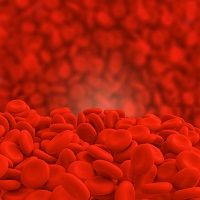Brain Atrophy in Multiple Sclerosis: Leaky Red Blood Cells to Blame?
Patients with multiple sclerosis may have excess iron in their brains, a possible explanation for brain atrophy, the debilitating condition some develop. If so, the culprit is likely leaky red blood cells, a UK team reported.

Leaky red blood cells allowing hemoglobin to ferry iron across the blood-brain barrier could be a cause of brain atrophy in some multiple sclerosis (MS) cases, according to researchers in Great Britain. Brain atrophy is a major cause of disability for patients with Secondary Progressive MS (SPMS), a stage of the disease that affects more than half of the MS patients who initially present with other forms of MS, the researchers wrote.
An intravascular rupturing of red blood cells (hemolysis) “is a potential source of the iron whose deposition along blood vessels in multiple sclerosis plaques [that] contributes to the neurodegeneration and consequent brain atrophy seen in progressive [MS] disease,” the researchers said in a paper published online last month.
“These are exciting but early results. If further studies confirm them, they may suggest new avenues of treatment, and hopefully more options to offer patients in the future,” the lead author, Charles Bangham, PhD, a professor in the Department of Medicine at the Imperial College London, said in a press release.
The study by Bangham and his colleagues aimed at identifying protein biomarkers of brain atrophy in a group of 140 patients with secondary progressive MS (SPMS). Using ELISA assays, they found “significantly higher” levels of hemoglobin in the blood serum of these MS patients compared with the controls.
From others’ previous studies they’d already learned that abnormal iron deposits in white and grey matter have been found in people with MS, that iron can potentiate oxidative damage, and that the iron deposits are greater in SPMS than in relapsing remitting disease. Their theory was that when red blood cells, which are fragile in people with MS, break down they release hemoglobin into the blood stream. Then the hemoglobin sneaks through an already weakened blood brain barrier. Hemoglobin transports oxygen and iron. In the brain the hemoglobin is attacked by an enzyme, haem oxygenase. That enzyme is present in high levels in MS patients. As the hemoglobin degrades, it releases iron. They found a 30% increase in free hemoglobin increased brain shrinkage by 0.1 percent.
Over a two-year period, the research team derived their theory from of a series of brain scans, comparative blood samples, and, to identify types of proteins, liquid chromatography-electrospray ionization tandem mass spectrometry.
“We were amazed by the results, and we were surprised by the size of the apparent effect of hemoglobin on brain shrinkage. Over a number of years it could significantly impact a patient’s symptoms,” Bangham explained in the press release.
He also said that chelation would not be a source of treatment. “It may be more effective to look at ways of removing excess hemoglobin from the blood, rather than iron. There are a number of drugs that do this, although none have been used for multiple sclerosis.”
The paper concluded, “These results do not suggest that free serum hemoglobin concentration is useful in the differential diagnosis of neurological disease; rather, they identify a potential contributor to the pathogenesis of neurodegeneration in progressive multiple sclerosis.”
The paper was published by Wellcome Open Research online November 15. Free serum haemoglobin is associated with brain atrophy in secondary progressive multiple sclerosis [version 1; referees: 1 approved, 2 approved with reservations] https://wellcomeopenresearch.org/articles/1-10/v1
Press release https://www.eurekalert.org/pub_releases/2016-12/icl-bsi121316.php
RELATED CONTENT
Iron Accumulation in Brain a Mysterious Sign in Multiple Sclerosis